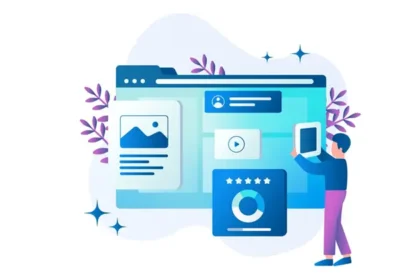Mobile app development is already pretty competitive as an industry. And the necessity to promote an app and make money from it is another critical challenge that start-uppers and businesses face. Over 65% of apps in major app stores receive almost no downloads, primarily due to poor visibility. This highlights the following issues: without an SEO strategy, apps remain unnoticed.
This article delves into the realm of SEO for mobile apps. We explore necessary actions and strategies to enhance app visibility. Contributions for this comprehensive guide come from Senior SEO expert Dmitry from Purrweb, a company renowned for its app development services.
Why Should You Leverage SEO for Mobile App Development Services?
You should optimize your mobile app for search engines and app stores if you want potential users to reach your app. Here’s a detailed breakdown why exactly you should invest your time and money into SEO:
- Improving brand reach on google. SEO helps your app appear more prominently in search results. Therefore it increases your brand’s visibility and reach. This is crucial especially for those companies, which plan to continue app development.
- Appearing on app packs. Google features app packs on search result pages. It appears when Google detects queries that might benefit from app suggestions. By optimizing your app for SEO, you increase the chances of appearing in these app packs.
- Enhancing visibility on app stores. App store optimization is a part of SEO that focuses on improving your app’s ranking in the app store. Higher visibility in app stores means more users are likely to discover your app.
- Growing organic downloads. With improved visibility both on Google and app stores, your app can achieve more organic downloads. This reduces the need for paid advertising. It can also significantly lower your customer acquisition costs.
- Increasing revenue opportunities. Improved visibility opens up more opportunities for generating revenue. Monetization options are endless and start with simple ads and subscriptions. This can be particularly beneficial for apps that rely on a freemium model.
What Types of SEO for Mobile App Development Services Are There?
To effectively enhance the visibility of your mobile app, it’s crucial to understand the different types of SEO strategies. Users discover apps in a variety of ways. Here are the primary SEO strategies used for mobile apps:
| Type of SEO | Description | Key Strategies | Expected Outcomes |
| Generic search | Users search for apps based on general functionalities without specifying a brand. | Utilize keyword research to identify high-volume, relevant terms. Optimize content on websites, blogs, and within app descriptions to include these keywords. | Increased visibility in search engine results for generic queries, leading to higher app discovery and potential downloads from users not specifically searching for your brand. |
| Organic brand name search | Occurs when users specifically search for your app by its name. | Ensure consistency in your app’s name across all online platforms. Use SEO tactics to dominate search results for your app’s name. Minimize confusion with similar names or competitors. | Users find your app easily when searching by name. It leads to improved brand recognition, as well as direct downloads. |
| App store optimization | ASO tailored to improve your app’s ranking within app stores. | Optimize the app title, description, and keywords. Use high-quality screenshots and videos. Encourage and manage user reviews. | Enhanced visibility and higher ranking increase the likelihood of conversions from views to downloads. |
How to Optimize a Mobile App for SEO?
Optimizing your mobile app for search engine optimization involves several components. Here’s what you have to consider:
- App title. The title of your app is the main element of your app’s metadata. It should be concise yet descriptive. It should contain the main keyword that best describes your app. The keyword must be what potential users are most likely to enter when searching for an app like yours. Keep the title under 30 characters.
- App keywords. For apps, it’s important to research and use keywords that are highly relevant and have a good search volume. These keywords should be used naturally within the app’s description and in other metadata fields. Use tools like Google Keyword Planner or Sensor Tower to find effective keywords relevant to your app’s functions and audience.
- App subtitle. Available particularly in iOS, the subtitle is a great place to incorporate secondary keywords. This field allows you to extend the context of your app’s title with additional descriptive text, up to 30 characters.
- App description. The description should provide a clear overview of what your app does. It should contain its features and its benefits. Use your primary and secondary keywords throughout the description. However, ensure that the text remains engaging and easy to read. Keep the most important information in the first couple of lines. That’s what users will see first without expanding the full description.
- Keep metadata updated. Search engines favor content that is regularly updated. They won’t tell you that directly, but it’s true. Regularly review and update your app’s metadata. Pay special attention to title, description, and keywords. This also includes updating visuals and screenshots in your app store listings.
- App ratings and reviews. Positive ratings and reviews not only improve your app’s reputation but also its SEO performance. High-rated apps are seen as more authoritative and are therefore ranked higher. Encourage satisfied users to leave positive reviews. Engage with the reviews by responding to them, whether they are positive or negative. This engagement shows that you value user feedback and helps maintain a high overall rating.
How to Do SEO for Application Development Services
Implementing effective SEO strategies is crucial for enhancing the visibility and success of mobile apps. Here’s a detailed table outlining key actions to optimize your application development services for better search engine performance:
| Action | Description |
| Strategic keyword optimization | Focus on identifying and utilizing high-value, relevant keywords throughout your app’s metadata, website content, and promotional materials. Use tools like Google Keyword Planner for research and integrate these keywords naturally to boost SEO. |
| Captivating app descriptions and visual storytelling | Develop engaging app descriptions that clearly highlight the features and benefits of your app. Complement this text with compelling visuals like screenshots and videos that tell your app’s story and showcase its functionality. |
| Optimizing website loading speed | Ensure that your app’s promotional website downloads fast. Use tools such as Google Page Speed Insights to analyze and improve performance. Speed is a critical factor in SEO and UX. |
| Nurturing reviews and user-generated content | Encourage users to leave reviews. Actively manage your review sections by responding to feedback. Promote user-generated content to attract new users through organic search. |
| Harnessing the power of social media | Leverage social media platforms to promote your app. Use social signals and shares to boost SEO. Link back to your app’s page or website to drive traffic. |
| Measure Your mobile app SEO | Regularly analyze the results of your SEO strategies. Use analytics tools to track user behavior and keyword performance. Adjust your strategies based on these insights. |
How SEO Can Be Beneficial for Mobile Development Services
SEO offers several advantages. Here’s how SEO can benefit mobile app promotion:
- Cost-effective marketing. Compared to paid ads, SEO is generally cheaper. This is especially beneficial for small businesses and startups. Moreover, SEO allows for a sustainable strategy with long-term results.
- Informed and improved content decisions. SEO involves more than just optimizing for keywords. It requires a strategic approach to content creation. Analyze what your audience is searching for. Then create relevant content that meets their needs and interests. This improves your app’s search rankings and enhances user engagement. Effective content tailored to your audience can lead to higher retention rates and more favorable interactions with your app.
- Competitive edge. To attract new users, you need to be easily discovered. With effective SEO, your app is more likely to appear at the top of search results.
Content Strategies to Promote a Mobile App
Blog content marketing is crucial for promoting your mobile app effectively. Here are some content ideas to enhance your app’s visibility:
| Content Type | Description | Implementation Strategies | Benefits |
| How-to guides and tutorials | Detailed content that helps users understand how to use your app. It can be a series of tutorials demonstrating how to perform specific tasks with it. | Create step-by-step guides or video tutorials. Focus on solving common problems or performing popular actions. | Increases user engagement by helping users make the most out of your app. Reduces confusion and supports queries. |
| User success stories | Stories of real users who have achieved significant outcomes using your app. | Collect testimonials and case studies from users who have seen great results. Highlight diverse experiences to appeal to a broader audience. | Inspires potential users by showcasing real-life benefits and outcomes. |
| Behind-the-scenes sneak peeks | Gives a glimpse into the development process and upcoming features. | Share videos or blog posts about the app development process, team interviews, or previews of upcoming features. | Humanizes your brand and creates anticipation for new updates. Strengthens user connection to your app. |
| Industry insights and trends | Content that positions your app as a part of industry trends. | Publish articles or reports on how your app aligns with or enhances current industry trends. Use data and analytics to support your insights. | Establishes your app as a thought leader in the industry. Attracts users interested in cutting-edge solutions. |
| Interactive contests and challenges | Engaging activities that encourage users to interact with your app for a chance to win something. | Organize contests that require using your app in a creative way or achieving certain milestones. Promote these activities across social media to increase participation. | Increases user engagement and encourages new downloads. Generates social proof and viral content. |
Examples of High-Quality SEO and ASO Optimized Apps
To illustrate how successful apps have utilized SEO and ASO effectively, here’s a detailed comparison of some popular applications that excel in these areas:
| App | Keyword Optimization | Value Proposition | Content Quality | CTA | Social Proof | Accessibility |
| Evernote | Excellently targets keywords related to note-taking and productivity. | Prominently highlights its utility as an app for note-taking, organizing, and archiving. | High-quality descriptions in app stores and on the website that clearly explain features and benefits. | Effective CTAs within the app and on the website linking to tutorials and premium upgrades. | Numerous positive reviews and ratings across platforms, featured user stories. | Available on iOS, Android, Windows, and web; seamlessly syncs across all platforms. |
| Notion | Targets keywords such as productivity, organization, and workspace solutions. | Clearly communicates its offer as an all-in-one workspace for notes, tasks, databases, and more. | The content is well-tailored to meet the needs of individual users and teams, highlighting diverse use cases. | Strong CTAs encourage users to sign up or explore different modules of the app. | High user ratings and extensive testimonials from a variety of businesses and freelancers. | Accessible on iOS, Android, Mac, Windows, and web, ensuring a unified user experience. |
| Duolingo | Optimizes for keywords related to language learning, education, and free courses. | Strong value proposition as a free, fun, and effective way to learn new languages. | Engaging and relevant content that adapts to user progress; frequent updates with new learning features. | Links within the app encourage users to try advanced lessons or share progress on social media. | Vast amounts of social proof through user reviews, success stories, and educational impact stories. | Supports multiple platforms including iOS, Android, and web, with synchronized learning progress. |
| MyFitnessPal | Utilizes keywords associated with diet tracking, fitness monitoring, and calorie counting. | Positions itself as a comprehensive tool for tracking nutrition and exercise to meet health goals. | Content is directly relevant to users’ health and fitness goals, offering tailored advice and dietary tips. | Calls to action encourage users to subscribe for personalized meal plans and detailed nutrition reports. | Thousands of positive user reviews and endorsements from health experts. | Available on iOS and Android with a highly responsive mobile site for easy tracking on any device. |
| Slack | Focuses on keywords like team communication, collaboration tools, and workspace chat. | Clearly defined as a hub for team collaboration that simplifies communication across organizations. | Rich, detailed content describing features, integrations, and benefits for different team sizes and industries. | Numerous CTAs throughout the app and website prompt users to download or upgrade to premium. | Strong social proof with case studies from renowned companies and extensive user testimonials. | Available on iOS, Android, Windows, Mac, and via web browsers, ensuring comprehensive accessibility. |
The Bottom Line
For some reason SEO remains unfairly underestimated. Hard work often goes unnoticed. However, those who discovered SEO and its benefits invest money heavily to maintain their positions.











